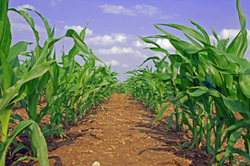Importance of Agriculture

"Agriculture is the cultivation of animals, plants, fungi and other life forms for food, fiber, and other products used to sustain life." The history of agriculture dates back thousands of years, and its development has been driven and defined by greatly different climates, cultures, and technologies. However, all farming generally relies on techniques to expand and maintain the lands suitable for raising domesticated species. For plants, this usually requires some form of irrigation, although there are methods of dryland farming; pastoral herding on rangeland is still the most common means of raising livestock. In the developed world, industrial agriculture based on large-scale mono-culture has become the dominant system of modern farming, although there is growing support for sustainable agriculture. Agriculture has an extreme importance in the well being and survival of man in this world. All the basic necessities of man are directly or indirectly fulfilled by agriculture. The major agricultural products can be broadly grouped into foods, fibers, fuels, and raw materials. In the 21st century, plants have been used to grow bio-fuels, bio-pharmaceuticals, bio-plastics, and pharmaceuticals. Specific foods include cereals, vegetables, fruits, and meat. Fibers include cotton, wool, hemp, silk and flax. Raw materials include lumber and bamboo. Other useful materials are produced by plants, such as resins. Bio-fuels include methane from biomass, ethanol, and bio-diesel. Cut flowers, nursery plants, tropical fish and birds for the pet trade are some of the ornamental products.
In 2007, one third of the world's workers were employed in agriculture. The services sector has overtaken agriculture as the economic sector employing the most people worldwide.
In 2007, one third of the world's workers were employed in agriculture. The services sector has overtaken agriculture as the economic sector employing the most people worldwide.
